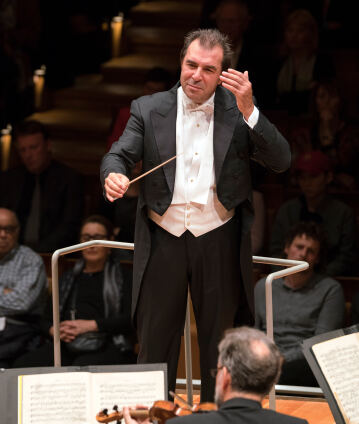Daniele Gatti conducts Hindemith and Brahms

In the 19th century, many regarded the symphony as obsolete. However, the genre continued to be impressively alive, as Daniele Gatti, chief conductor of the Concertgebouw Orchestra Amsterdam, demonstrates in this concert. The programme includes Johannes Brahms’s lyrically melodious yet highly innovative Second Symphony and Paul Hindemith’s symphony Mathis der Maler, a sumptuous-sounding play on Baroque forms.
Daniele Gatti, current chief conductor of the Royal Concertgebouw Orchestra Amsterdam, has held the artistic fortunes of many internationally renowned orchestras and opera houses in his hands – including the Accademia Nazionale di Santa Cecilia, the Royal Philharmonic Orchestra, the Orchestre National de France and the Teatro Comunale di Bologna plus Zurich Opera. Gatti celebrates his 20th anniversary as a guest conductor with the Berliner Philharmoniker with a programme that features two quite different works from the symphonic repertoire.
The Second Symphony by Johannes Brahms was started while the composer was on holiday at the Wörthersee in 1877 (“The melodies fly so thick here that you have to be careful not to step on one” [Brahms]), and was completed in October of the same year. With his tongue firmly in his cheek, he told his publisher that the work was “so melancholy that you will not be able to bear it. I have never written anything so sad, and the score will have to be printed on black-bordered pages!” However, the Vienna premiere of Brahms’s Second on 30 December 1877 surprised the audience with music that, in the words of the Viennese critic Eduard Hanslick, “shines like the warming sun,” and “radiates a healthy freshness and clarity”, but yet “here is nevertheless much to listen to and dwell on”.
We are taken to very different realms in Paul Hindemith’s symphony Mathis der Maler, commissioned in 1933 by Wilhelm Fürtwängler, and based on the composer’s at that time still unfinished opera. The titles of the work’s movements – “Concert of Angels”, “Entombment” and “The Temptation of St. Anthony” – relate to the painted panels of the Isenheim altarpiece created by Matthias Grünewald between 1510 and 1516. While the music reflects Hindemith’s personal living conditions after the Reichstag election of 1933, the modernist idiom of the composer was a thorn in the side of the Nazis, as was his marriage to a “half-Jew”. After Hindemith’s career as a violist came to an end as a result of the ban on him performing, and the publication of his Handbook of Music was prevented, the premiere of the Mathis symphony by the Berliner Philharmoniker under the baton of Furtwängler on 12 March 1934, acclaimed by audiences and critics alike, was a cultural and political ordeal. The rest is history: in 1938, despite resolute support from Furtwängler, Hindemith decided to turn his back on Germany and did not return until the end of the 1940s.
© 2017 Berlin Phil Media GmbH
Related interviews
Artists
Our recommendations
- Daniele Gatti conducts Brahms, Stravinsky and Webern
- Daniele Gatti’s journey from the Romantic to the modern era
- Daniele Gatti conducts masterworks of French modernism
- Daniele Gatti conducts Schoenberg, Strauss and Wagner
- Daniele Gatti conducts Stravinsky and Shostakovich
- Teodor Currentzis’s debut with Verdi’s Requiem